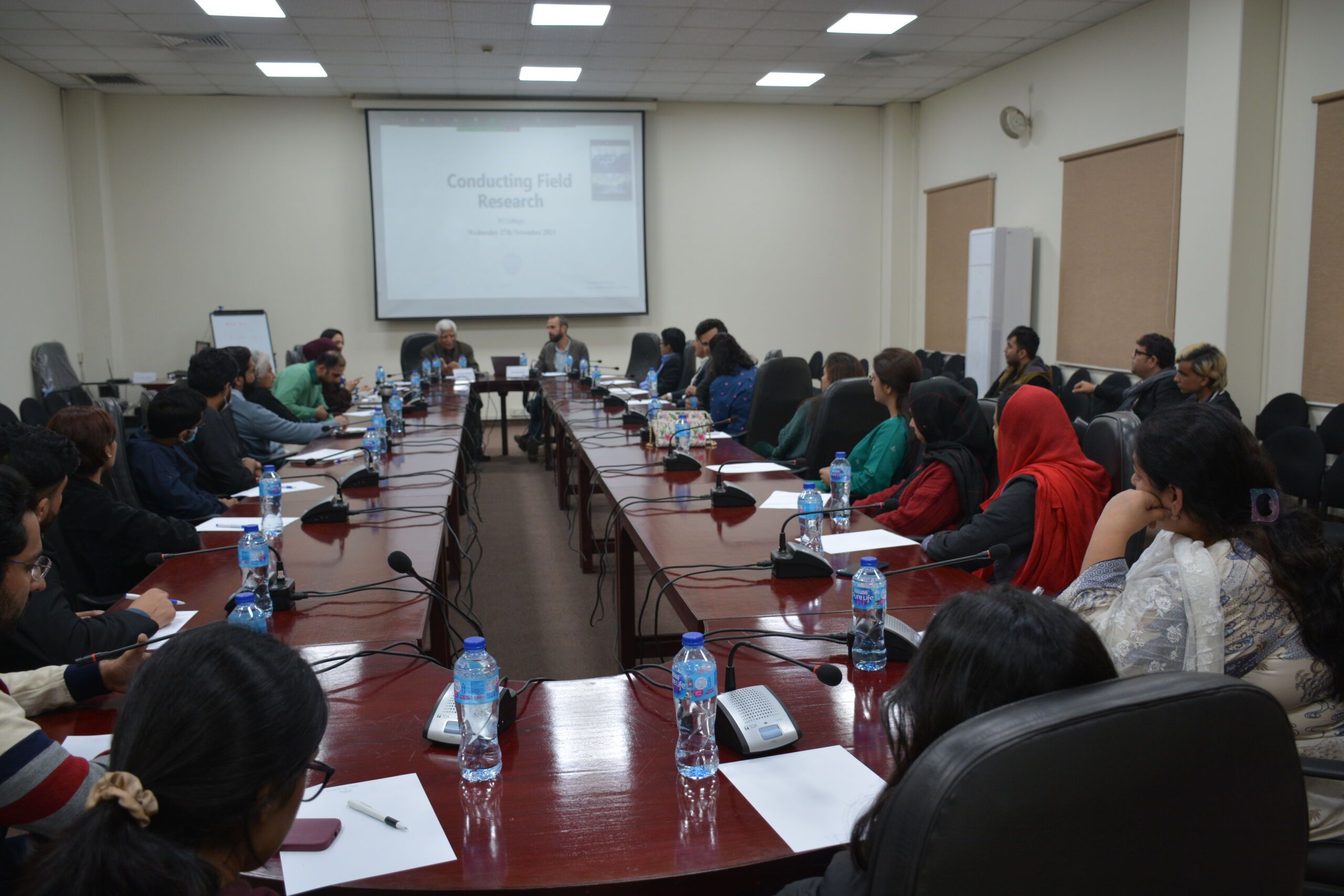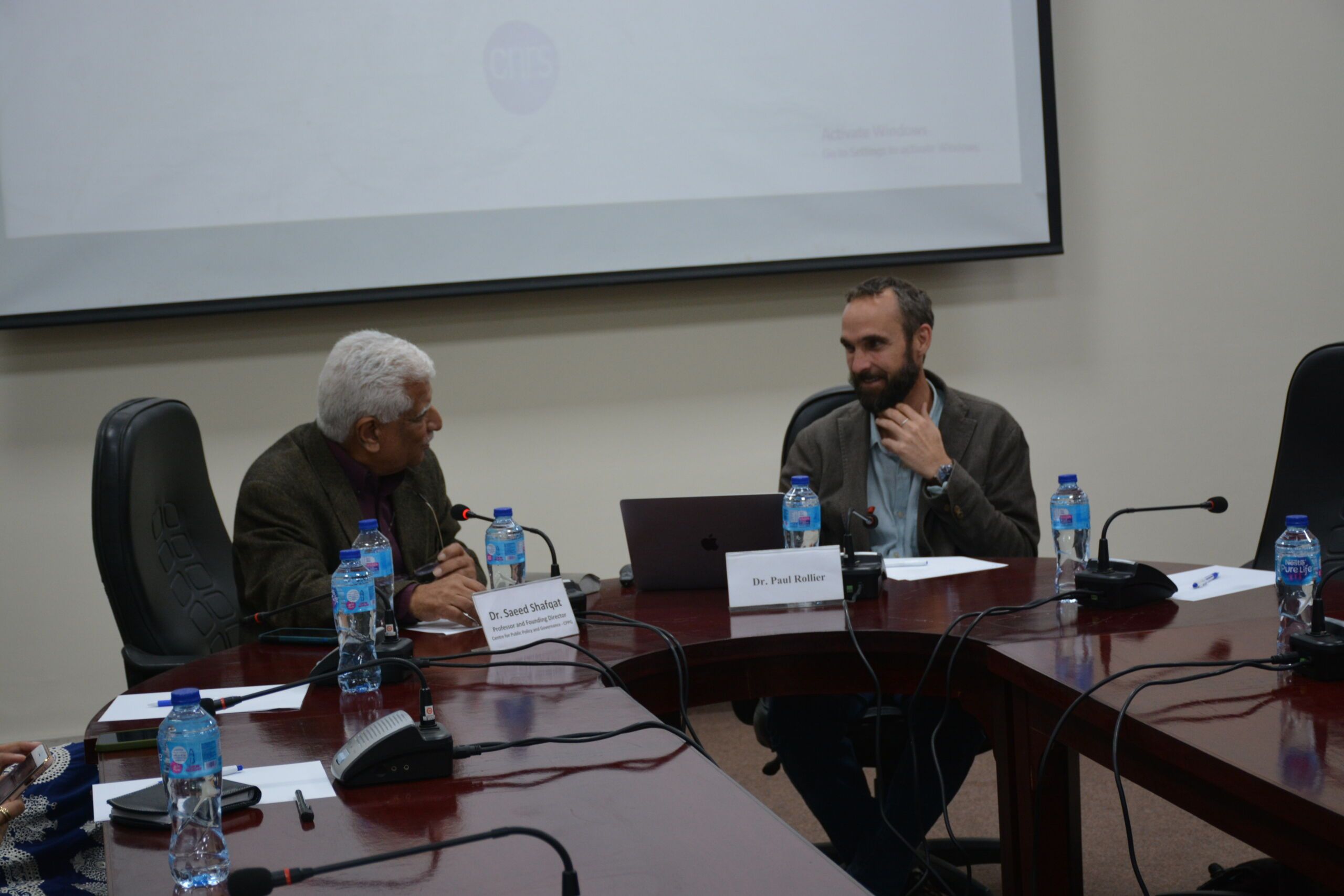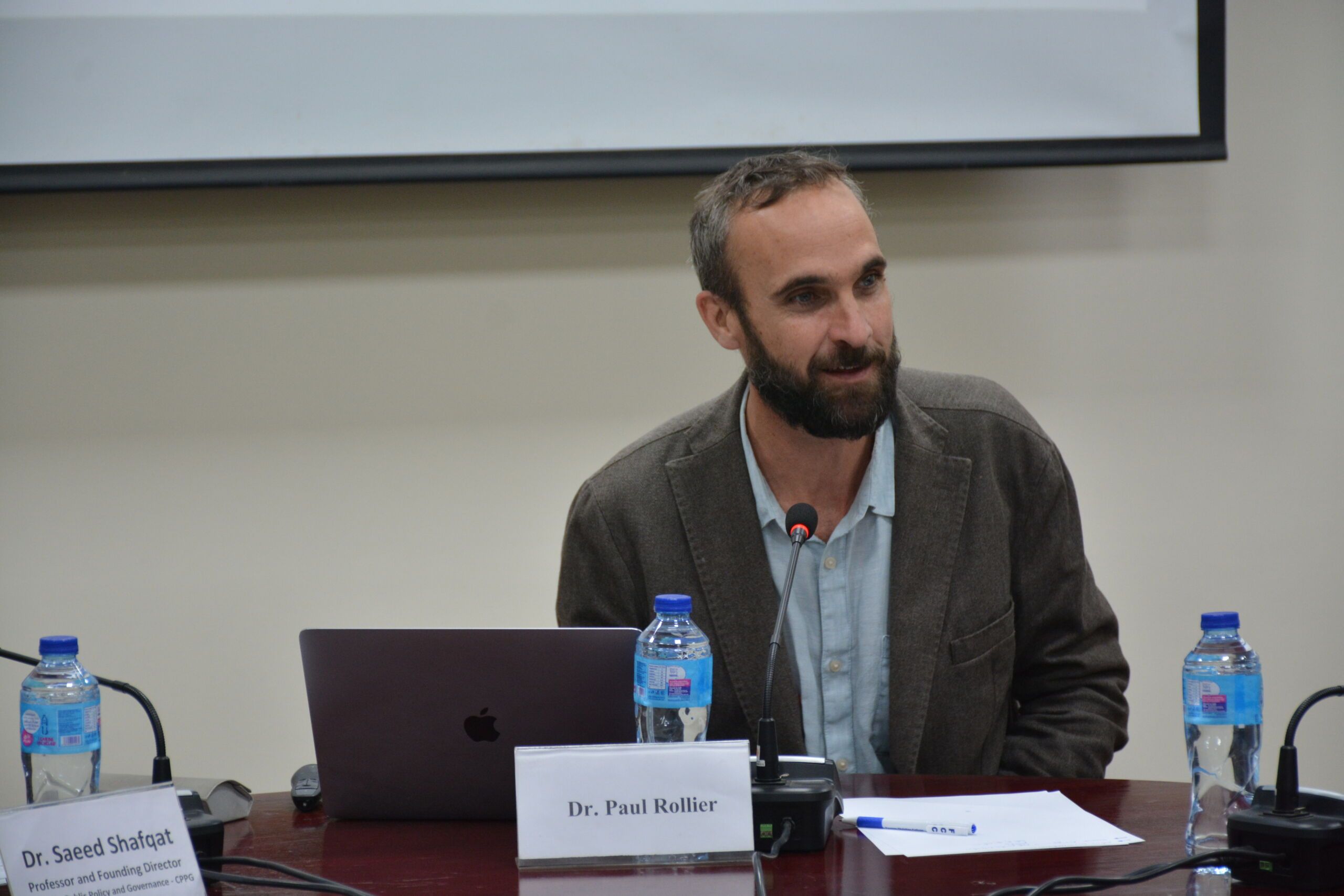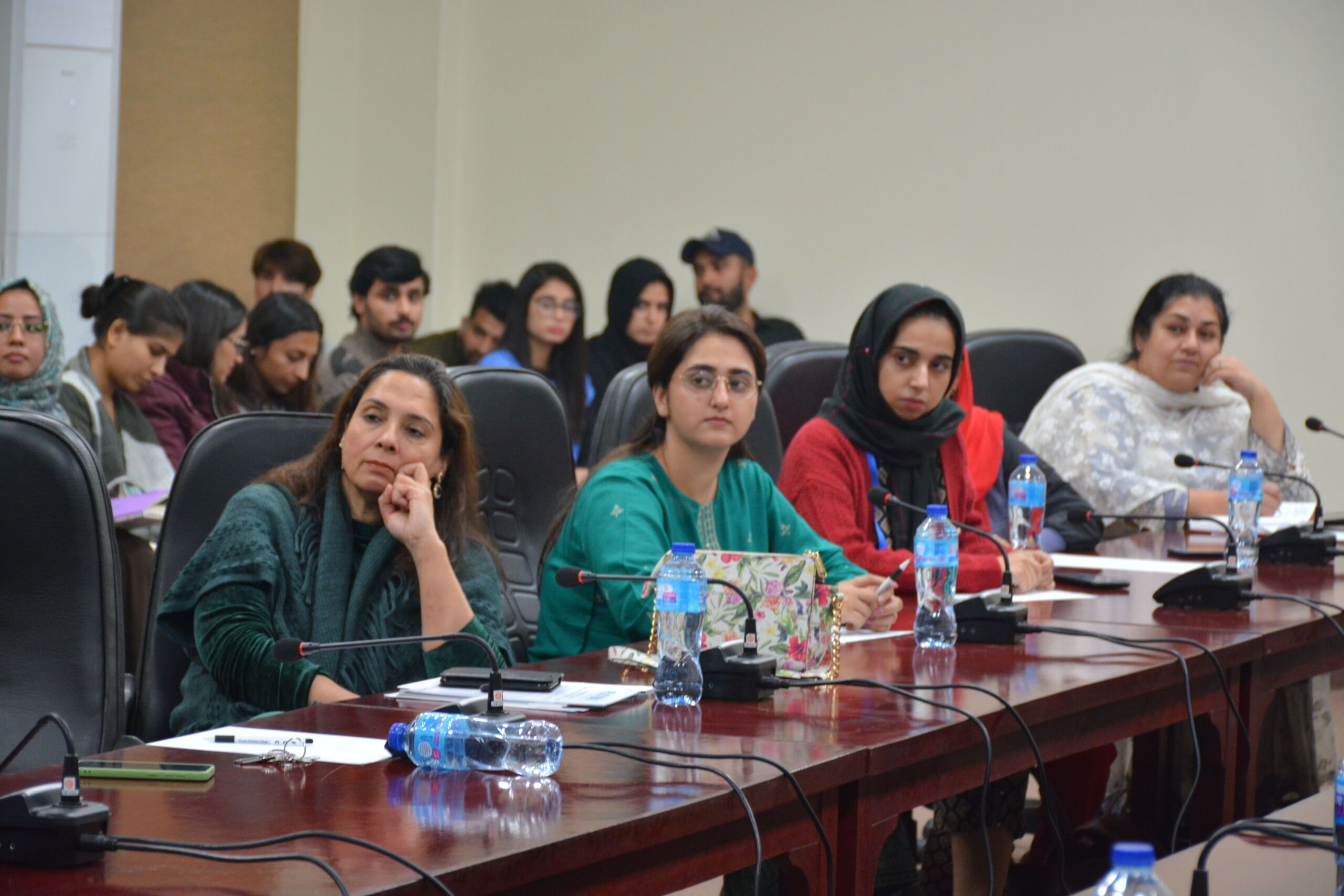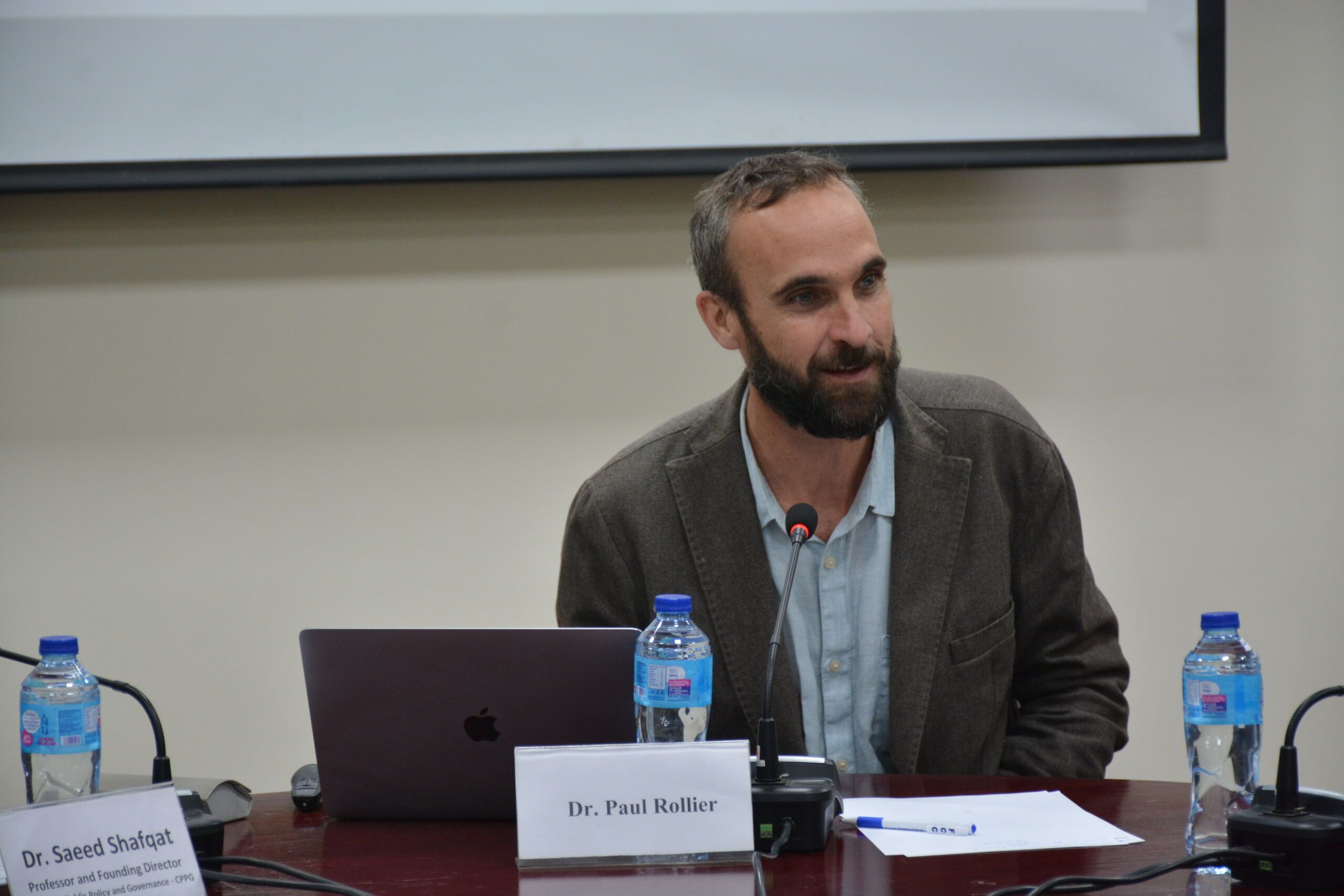
Conducting Field Research
Seminar
Past Event
Nov 27, 2023 - 4:00 pm |
Nov 27, 2023 - 6:00 pm
Dr. Paul Rollier
E-002 CPPG FCCU
Upcoming Event
On Monday, November 27, 2023, CPPG organized a seminar on “Conducting Field Research”. Dr. Paul Rollier, a CNRS researcher at the Cesor-EHESS, and also a Non-Resident Research Fellow at the Centre for Public Policy and Governance, FCCU. Dr. Rollier’s research interests include the anthropology of religion (Islam and Christianity) and the cultural logic of justice and political representation in South Asian Muslim societies. He has several publications to his name including Mafia Raj: The Rule of Bosses in South Asia which he co-authored and Outrage: The Rise of Religious Offence in Contemporary South Asia in which he was a co-editor. The talk was moderated by Dr. Saeed Shafqat, the Founding Director and Professor at CPPG.
Dr. Rollier, started by introducing the definition of anthropology, by claiming that it aims at making the familiar strange and the strange familiar. It is a comparative study of human societies. It works for de-naturalizing the pre-conceived notions about a society or group of people, by intermingling with them to understand their lived experiences and then formulating a comparative analysis between the previous assumptions and the lived experiential knowledge. For this, anthropological studies have introduced various research methods. The most commonly used one is ethnography which involves the process of writing about certain people. The word ethnography has been derived from Greek where ethnos means mankind and ‘graphy’ means writing. In the past three decades, this method has caught the imagination and is being practiced by several disciplines, such as; sociology, social psychology, human geography, etc, and has boar fruits in the form of various commendable researches.
Tracing the origins of this method, he informed that it was born in the 20th century and is a product of colonial enterprise. Anthropological studies have deliberated on the foundation of the research method which has long been dictated by the colonial powers i.e. equipped with the purpose of serving the colonial power by categorizing people into different stratas. But, realizing this inherent bias, various anthropologists have criticized the colonial construction embedded within the research method and have been working to decolonize the discipline itself. Identifying Bronislaw Malinowski, the founding father of the school of functionalism, who advocated the practice of intense fieldwork and the formation of new methods in social theory. Through his research, he lived in the Trobriand Islands for four years, learned their language, experienced their reality, and understood their life patterns. With his experience of living like a local, he was able to make better sense of their lives. In the 1960s, his diaries became public which shocked the discipline itself about the ethnocentric approach of seeing and generating knowledge. Ethnocentrism is an evaluation of other cultures through one frame of reference and judging other cultures, behaviors, beliefs, and people through it. In this discipline, the frame of reference was Western modernity. He remarked in anthropology, besides ethnography, there are other methods as well.
Moving forward, Dr. Rollier shared that the ethnographic data is collected through participant observation which involves becoming a part of the society, doing what they are doing over an extended period, and making sense of their experiences. It is an ‘empathetic immersion’ into a different culture, developing intimate familiarity with the people over a period of time to be able to reconstruct the life of the interlocutors. The tools for this observation include: paying attention to everyday social activities, gaining local’s trust, getting accepted, learning their language, going to work, attending weddings, collecting local histories, and conducting informal interviews, and collective discussions. The dream for an anthropologist is to finally become invisible as if people cannot identify him as someone distinct from themselves One condition necessary for conducting participant observation is to suspend your judgment; and notions about religion, politics, etc., and be genuinely empathetic. After undergoing this process, an anthropologist has to refine the questions. A 12-month minimum fieldwork is required then the notes are transformed into proper field notes. Along with this, quantitative data is also collected at the ending stages of fieldwork through surveys, filming, photographic representation, and questionnaires. For this, he has to be reflexive in his approach i.e. pay attention to his own emotions as his body is also a form of tool. This reflexivity is indispensable, as it becomes evident in his writings, indicating if the writer is hiding something or is transparent in showing all the minute details.
Dr. Rollier also referred to an American Anthropologist, Clifford Greetz, who defines ethnography as an interpretative act of thick description i.e. giving as much detail about a certain setting as possible to understand reasons behind human actions and how people construct meaning about their cultural practices through the use of symbols. In the words of Geertz, “What we call our data are really our own constructions of other people’s constructions of what they and their compatriots are up to.” This implies that, as a social actor, an ethnographer tries to conduct a transcultural meaning about a certain phenomenon through the way actors themselves invest meaning in what they do. In this layered process, he does not indulge himself with the task of finding a social truth but he works to interpret the interpretation.
Discussing the strengths and weaknesses of this layered process, Dr. Rollier highlighted that attention to minute details and deep observations is one of the strengths of ethnography. It helps in avoiding sweeping generalizations about a group of people as it accepts and portrays the inherent complexities persistent within societies. Nevertheless, it has some limitations as well. The picture portrayed is never a full description, it is selective and close to one’s personal biases. Dr. Rollier remarked that objectivity is what an anthropologist aims for but the personal perspectives are depicted in the work somehow. He cautioned that for an anthropologist, there is always a risk of going native as he develops a strong familiarity with the community that makes it hard to remain critical and objective. Therefore, one needs to be dispassionate and objective.
Dr. Rollier underscored that adherence to specific ethical guidelines is imperative. It involves due respect for legal frameworks and cultural taboos, along with a commitment to transparency regarding the research’s purpose, funding sources, and ultimate objectives. Obtaining informed consent and ensuring the voluntary participation of individuals are foundational principles.
For Post-fieldwork, aligning collected data with colleagues’ perspectives is imperative in drawing meaningful comparisons. Moreover, in response to historical biases, anthropologists are now engaging in collaborative efforts, co-authoring with native anthropologists, and using diverse media formats, such as documentary films and recordings, to amplify authentic voices and counteract colonial prejudices. This inclusive approach extends to native anthropologists studying their own cultures, thus promoting a more comprehensive and unbiased understanding. Regardless of this, Dr. Rollier shared that anthropologists undergo a series of challenges, in both cases of being a foreigner or a native. A foreign anthropologist is considered a risk or an agent with a foreign agenda, and if proved otherwise, faces several monetary or social expectations. Whereas, a local anthropologist faces his own prejudices that are hard to avoid.
The session was followed by a stimulating Q&A session. Dr. Shafqat thanked Dr. Rollier for a theoretically rigorous, methodologically enriching, and insightful presentation.


